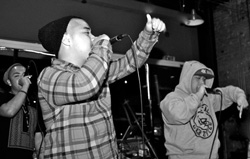 by: Lauren
by: Lauren
Many rising hip-hop artists today try to make it big by spitting the same rhymes of fame, fortune, sex and drugs. But once in a while, there are those rare beacons of light that illuminate hope in a very real, anti-MTV trash way.
With their new school talents and the soulful beats of DJ E.T. (Eric Tandoc), Shining Sons put out a fresh spin on old school rap as they performed live on October 15, 2010 at KUCI. The two brothers, Josh and Jedi Jimenez, were once former gang members in the areas of Long Beach and Carson, California. Now these two young men are members of Filipino rights organization Anakbayan Los Angeles and today create music that educate youth about positive change and social justice for oppressed people everywhere.
The following interview with the duo regarding their work with hip-hop and youth activism was hosted by Lauren of the KUCI public affairs program Activism for Amateurs
How long have you been MC?s?
Intellect: We have been MC?s for about one year now, but we started rapping at the age of 13. It has only been since last year when we wanted to start taking rap seriously.
How does your hip-hop music differ from all the other mainstream hip-hop artists out there?
Intellect: Our music teaches youth about why they are in the situation they live in. I?m aiming towards high school youth who are now-a-days really into gangs and things of that nature. Rappers today glorify gang life and express it in a negative way and carry on the oppressive mindset of hurting another black or brown man. Hip-hop is very negative. It?s one thing to rap about cars, women, and jewelry, but it?s another when you actually did things in the hood like shooting someone?That triggered me to remold my habits personally and flush out the negativity from my music. It is a long process and I?m still trying to change my ways. Once I step out the door, already someone is vulnerable to getting shot or getting robbed. Where I?m from, it?s not easy being young and brown?
What similarities do you see between the gang life in Long Beach and the Filipino movement for social change going on today?
JEDI: Gang life [is similar] to the [Philippines?] struggle against U.S. imperialism and oppression [in that] gangs come out of an imperialist system. Gangs come from under-privileged youth who have no family [and] who find family in a group of young people to protect their neighborhood and rep their hood. With black and brown youth not having much resources to jobs, social services, etc., youth have no other option but to slang and gang-bang on the neighborhood blocks to survive and live to see another day. That is why we have to constantly arouse and organize the youth so that they themselves can create change in their own communities and carry on the revolutionary tradition ? [to] create change in a positive way.
Why do you feel it is important for youth to be involved in activism?
JEDI: Youth hold the power to create systemic change in our communities. We are the next generation. We are at the prime of our lives. It?s up to us to choose what we want to do. The reality is that youth are the most affected. Who can change this system? We can. All it takes is educating the young people and letting them know the truth about why things are the way they are.
You can check out Shining Sons on their tumblr.
Share
|
|

